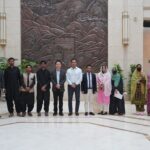HYDERABAD, Pakistan: Pakistan Atomic Energy Commission’s (PAEC) Chairman Muhammad Naeem has the Federal Government has set a target of generating 40,000 megawatt electricity from nuclear energy by 2050.
“A lot of manpower will be required to meet this target,” he observed while addressing at Nuclear Institute of Agriculture (NIA) in Tando Jam on Wednesday.
He said the power generation from nuclear energy would be increased to 8,800 MW by 2030.
Naeem acknowledged the contribution of NIA since it was established in 1955.
He observed that development of a country was based on education, health, better nutrition and the national defence.
“In view of these needs, the PAEC is working on multiple tasks for progress and development of Pakistan,” he added.
He informed that around 700,000 people receive medical treatment at the PAEC’s 18 cancer hospitals in the country.
Naeem said NIA was carrying out research and development of various crops including rice, cotton and sugarcane as well as livestock breeding, increasing milk production and food security.
“Through their hard work, the scientists in NIA have developed 32 new varieties of wheat, rice, cotton, sugarcane and pulses crops.
The Kiran and Ambar varieties of wheat and and Shandar variety of rice are most popular,” the Chairman said.
He assured that despite shortage of resources the PAEC and the connected institutions and the scientists working there would never disappoint the nation.
Naeem encouraged the higher education institutions working in the field of agriculture to promote exchange of faculty and students with other institutions in the country.
He noted that the climate change had posed a new challenge for agricultural production in the whole world, adding that Pakistan was among the countries which were at the risk of being affected by the climate change.
“Noticeable changes in the rain pattern and low rainfall, long spells of hot weather are affecting the agricultural production,” he added.
Earlier, Director of NIA Nazeer Ahmed informed that 13 varieties of wheat, 5 of cotton, 7 of rice and 4 of sugarcane, among other crops, had been developed at the institute.
The scientists at the NIA were working on 4 more varieties of the wheat crop, he added.
Sindh Agriculture Forum’s President Noor Ahmed Nizamani, Sindh Abadgar Board’s Vice President Maj (R) Umar Farooq, the officials of Fauji Fertilizer Company and Sindh Agriculture Department and the farmers attended the event.
Source: APP





